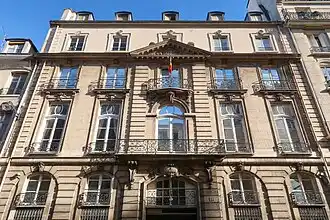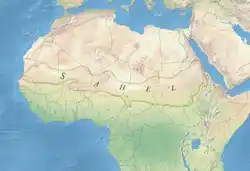
Sub-Saharan settlement in France is a phenomenon which has occurred as a result of the colonial activity of France since the middle of the nineteenth century. France’s colonial links in Africa go back to the seventeenth century when it established a number of slave-trading stations on the coast of western Africa around what is now Senegal. Later, beginning in the 1830s, it began to conquer Algeria, a process took many, many decades to complete. The period of most intense French colonization of Africa was between the 1860s and the early 1910s during the wider European Scramble for Africa. During this half a century long period the French conquered a vast expanse of Sub-Saharan Africa, particularly the Sahel region running from Mali all the way east to Chad, including Niger, Upper Volta (modern-day Burkina Faso) and the Central African Republic, and also much of the more coastal parts of the continent in places like the Ivory Coast, Togoland and Gambia. During the era of French colonial rule small numbers of people from these countries came to France. The real spike in Sub-Saharan settlement in France came after the Second World War as decolonization accelerated and as people moved to France to take up work there owing to labor shortages following the war. There are hundreds of thousands of Sub-Saharan Africans living in France today, or French-born people with Sub-Saharan ancestry, with a large number coming from countries like Senegal and Mali in particular.[1]
Research your ancestors on MyHeritage
Sub-Saharan settlement in France chronology of eventsSub-Saharan settlement in France chronology of events

France’s involvement in Sub-Saharan Africa goes back to the seventeenth century when it became involved in the slave trade along the coast of western Africa. This led to the development of its first colony in the region, what is now Senegal. That remained broadly its only colony in Africa prior to the nineteenth century. It was only once the Scramble for Africa began in the second half of the nineteenth century that France began swallowing up vast chunks of western Africa to try to rival the British expansion further east.[2] France, for instance, became the dominant power across the Sahel region, with colonies running through modern-day Senegal, Mauritania, Burkina Faso, Niger and Chad. To the south the French also acquired places like the Central African Republic, Ivory Coast, Togoland and Gambia, while further afield the French conquered and colonized the island of Madagascar and a chunk of Somaliland in the Horn of Africa.[3]
This colonial activity is the ultimate root of Sub-Saharan settlement in modern-day France. As soon as the European powers involved themselves in the colonization of a particular part of the world, traffic commenced whereby some individuals from the colonized region began moving to the metropolitan colonial nation. Small numbers of Sub-Saharan Africans, for instance, would have begun spending time studying in Paris and other cities of France in the early twentieth century and during the interwar era, often studying in the universities there. The First World War saw many colonial units serving on the Western World in France, increasing the Sub-Saharan experience of France itself.[4]
While this pattern of Sub-Saharan settlement in France during the colonial era was important, it was limited in scale and often fleeting. In reality the vast majority of Sub-Saharan settlement in France has actually occurred in the post-colonial era. France and Britain, the two major European colonial powers in Africa following the end of the Second World War, both rapidly granted independence to their colonies here in the late 1950s and 1960s. Once this had occurred, France continued to maintain a strong political, economic and cultural influence in its Sub-Saharan colonies through the Françafrique system. For instance, this tied the currencies of France’s former African colonies to the French franc, its pre-euro currency. It was partly the Françafrique system that would lead to considerable migration from Sub-Saharan Africa to France from the 1960s onwards, as well as post-war labor shortages in France itself.[5]
Extent of Sub-Saharan settlement in FranceExtent of Sub-Saharan settlement in France

Migration from countries in Sub-Saharan Africa to France tended to overlap with crises in Sub-Saharan Africa. Independence was intended to see power devolved to native democracies, but in reality across Africa military dictators seized power within a few years of independence. Later these were often only overthrown in the 1980s and 1990s through violent civil wars, while the Sahel region has been highly unstable over the last decade or so. All of these issues, combined with modern problems like desertification and political instability in the Sahel region, acted as push factors which drove hundreds of thousands of people to leave countries like Mali, Niger, Burkina Faso and Chad.[6]
France was a natural location for them to migrate to, not only because of the Françafrique system, but also because of wider ties. France left behind French as a first or second language in its former colonies for the most part. Thus, a lot of people who were heading to Europe as refugees or as economic migrants from the 1960s gravitated towards the former colonial power. It was a place where they already spoke the language and where there was a more receptive environment owing to the former ties between these nations and France. In time, like any diaspora community, when a block of Malians, Senegalese or Chadians had settled in a part of Paris, Marseille or Bordeaux they drew more and more of their compatriots as there was strength in numbers. Over time, hundreds of thousands of Sub-Saharan migrants have migrated to France. In 2015 alone it was recorded that there were over 600,000 people from African states resident in France, most of them having come from Sub-Saharan African states like Mali (76,500), Senegal (67,000) and the Congo (64,000). This figure, if added to second and third-generation Sub-Saharan Africans in the country, gives a sense of the scale of the migration.[7]
Demographic impact of Sub-Saharan settlement in FranceDemographic impact of Sub-Saharan settlement in France

The demographic impact on the population of France as a whole of this Sub-Saharan migration was not enormous. France, after all, is a country of nearly 70 million people. Some migrant populations are much more substantial. For instance, there are upwards of two million French Algerians living in France today, a result of the much more interconnected history of France and Algeria between the 1830s and the 1960s. Nevertheless, the number of French people of Sub-Saharan heritage in France today is still quite considerable. The Malian and Senegalese communities are especially notable and they are particularly important in specific parts of France, notably certain suburban enclaves of Paris like the Goutte d'Or district in the 18th Arrondissement of the city. Marseilles has the largest concentration of Sub-Saharan people in the country outside of Paris owing to the city’s location on the south coast of France and other factors such as its sheer proximity to Africa. Unfortunately, much of this migration has often been into slum suburbs and districts in some of France’s larger cities over the decades, as the Sub-Saharan population was segregated from other parts of French society in these cities.[8]
Many people in France today will be able to trace their genealogical roots to Sub-Saharan Africa and the ties between the European country and its former colonies. A sign of how substantial the contribution of Sub-Saharan settlement has been to modern France is seen in some of its sporting achievements. A large number of France’s football World Cup winning teams in 1998[9] and 2018, players like Patrick Vieira, Marcel Desailly, N’Golo Kanté, Kylian Mbappé, Paul Pogba and Samuel Umtiti, were either born in Sub-Saharan Africa or in France to parents who had settled in France after leaving countries like Guinea, Mali and Cameroon in the post-colonial era.[10]
See alsoSee also
Explore more about Sub-Saharan settlement in FranceExplore more about Sub-Saharan settlement in France
- France, Names & Stories in Newspapers records collection on MyHeritage
- France, Vital Records Index records collection on MyHeritage
- Filae Family Trees records collection on MyHeritage
- France, Births and Baptisms records collection on MyHeritage
- France, Church Baptisms and Civil Births records collection on MyHeritage
- France Deaths records collection on MyHeritage
- An overview of the massive new record collection from France at Legacy Tree Family Webinars
References
- ↑ Jean-Philippe Dedieu, ‘The Rise of the Migration-Development Nexus in Francophone Sub-Saharan Africa, 1960–2010’, in African Studies Review, Vol. 61, No. 1 (April, 2018), pp. 83–108.
- ↑ https://www.ebsco.com/research-starters/history/scramble-africa
- ↑ Henri Martin Barzun, ‘France’s African Empire’, in Current History (1916–1940), Vol. 19, No. 2 (November, 1923), pp. 230–236.
- ↑ C. M. Andrew and A. S. Kanya-Forstner, ‘France, Africa, and the First World War’, in The Journal of African History, Vol. 19, No. 1, World War I and Africa (1978), pp. 11–23.
- ↑ Timothy Gibbs, ‘A French Neo-Colonialism?: The Controversial Concept of Françafrique’, in The English Historical Review, Vol. 139, No. 596 (February, 2024), pp. 193–214.
- ↑ https://www.cfr.org/global-conflict-tracker/conflict/violent-extremism-sahel
- ↑ https://www.diplomatie.gouv.fr/en/country-files/africa/the-african-diaspora-in-france/
- ↑ Jean-Louis Pan Ké Shon and Gregory Verdugo, ‘Forty years of immigrant segregation in France, 1968–2007’, in Urban Studies, Vol. 52, No. 5 (April, 2015), pp. 823–840.
- ↑ https://edition.cnn.com/2018/06/08/football/france-1998-world-cup-win-anniversary
- ↑ https://www.espn.co.uk/football/story/_/id/37558270/france-proud-represent-africa-world-cup-final-deschamps

